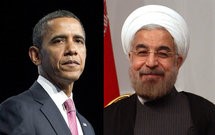 An apparent U.S. decision to try to end nearly 35 years of unremitting hostility with Iran represents a major geopolitical shift.
An apparent U.S. decision to try to end nearly 35 years of unremitting hostility with Iran represents a major geopolitical shift.
Getting to this point has been a long, arduous process for the two adversaries. The road ahead will not be any easier.
U.S. President Barack Obama and his Iranian counterpart, Hassan Rouhani, each delivered a speech at the U.N. General Assembly in New York on Tuesday, but a much-anticipated handshake between the two leaders did not take place. Such a gesture was unlikely for many reasons, especially considering the steep political resistance to easing tensions both presidents face at home.
However, Obama's declaration in his speech that Washington is not seeking regime change in Tehran was indeed a major development. Moreover, Obama also recognized Iranian Supreme Leader Ayatollah Ali Khamenei's recent fatwa against the use of nuclear weapons, and the president acknowledged the CIA's involvement in the 1953 coup that toppled a democratically elected Iranian leader. These were not random observations; they were carefully worded statements that addressed key Iranian demands.
The clerical regime in Tehran has long demanded that the Americans accept and respect Iran as it is and admit that the United States has acted against the Islamic Republic before talks with Washington could be held. Indeed, the Rouhani administration has been engaged in intense back-channel communications with the White House in an attempt to extract such concessions.
Rouhani's recent calls for "prudent moderation" aside, he needed such gestures from the White House to be able to convince Iranian stakeholders to support his diplomatic initiative. Rouhani's decision to not meet with Obama even casually spoke volumes about the constraints under which the Iranian leader is operating.
That said, Rouhani has been successful in getting Obama to reciprocate Iran's recent overtures -- a considerable feat for the new president. But now that Rouhani has gotten what he wanted from Obama, the ball is back in the Iranians' court.
Obama has gone about as far as he can, and he faces far more domestic resistance to the diplomatic process than the Iranian president. Rouhani can use Iran's dire economic situation due in part to U.S.-led sanctions on the country as a means to advocate for a diplomatic change of course. By comparison, Obama's task of selling the negotiations to the U.S. Congress is more difficult.
This is why, in his speech, Obama said that the diplomatic ties with Tehran can be improved only if the issue of Iran's nuclear program can be resolved. Domestic concerns are also why Obama has resisted bilateral negotiations, instead delegating U.S. Secretary of State John Kerry to engage with his Iranian counterpart, Javad Zarif, in the multilateral "P-5+1" setting, which includes the five permanent members of the U.N. Security Council and Germany.
This format of negotiations and the slow pace of the diplomatic process works for the Iranians as well. But Tehran's challenge now is to convince the United States that it is not developing nuclear weapons while still retaining the ability to harness nuclear technology for civilian use. While Obama and Rouhani have accommodated each other's needs and generate unprecedented diplomatic momentum up to this point, the two presidents will struggle to continue apace going forward.
Courtesy : Stratfor (www.stratfor.com)